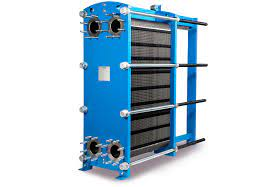
What is a Plate Heat Exchanger?
A plate heat exchanger is a type of heat exchanger that uses metal plates to transfer heat between two fluids.
This has a major advantage over a conventional heat exchanger in that the fluids are exposed to a much larger surface area because the fluids are spread out over the plates
Plate Heat Exchanger Suppliers In South Africa
HGF Plate Heat Exchangers (Pty) Ltd
Address: Meerzicht Business Park, 15, 33 Kelly Rd, Jet Park, Boksburg, 1459, South Africa
Hours: Closed ⋅ Opens 7 am Mon
Phone: +27 11 397 6288
UmvuzoPlate Heat Exchangers (Pty) Ltd
Address: 10 Lebombo Rd, Alrode South, Alberton, 1451, South Africa
Hours: Open ⋅ Closes 5 pm
Phone: +27 11 900 1483
SA HEAT EXCHANGE
Address: 11 Suzuka Rd, Westmead, Durban, 3608, South Africa
Hours: Closed ⋅ Opens 7 am Mon
Phone: +27 31 811 0061
HDR Products – Plate Heat Exchangers
Address: 12 Foundry St, Isando, 1600, South Africa
Areas served: South Africa
Hours: Closes soon ⋅ 4 pm ⋅ Opens 8 am Mon
Phone: +27 11 568 2452
Frigotherm
Address: Extension 10JohannesburgSouth Africa, Unit 9 EP Factory Park1055, Anvil St, South Africa
Phone: +27 11 672 4203
What is the most effective heat exchanger?
Plate-type heat exchangers have a more compact design and offer higher heat transfer coefficients due to their larger surface area per unit volume compared to shell and tube heat exchangers.
This makes them more efficient in applications where space is limited or when handling fluids with low viscosity.
How long do plate heat exchangers last?
A heat exchangers lifespan depends on a number of factors. A typical heat exchanger should last for around 10 years in full working order.
Do plate heat exchangers fail?
You don’t need to be an expert technician to troubleshoot your plate heat exchanger (PHE). PHEs are long-lasting, however, they do occasionally have performance difficulties.
Leakage outside the unit, leakage within the unit, and pressure drop are the three most common problems with PHEs.
Do heat exchangers use a lot of electricity?
Because heat exchangers are usually employed for energy-intensive operations, the largest operating costs is usually that of the energy, such as the gas, electricity, or other fuel used to heat (or cool) the service fluid. This means that energy efficiency is a key factor when choosing a heat exchanger.
